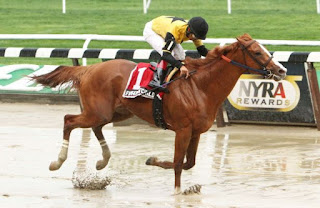 |
| When a horse exercises for a long period of time, such as this eventing horse, he continuously loses fluids and electrolytes through sweat.(credit) |
Performance horses are conditioned so that their muscles work more efficiently, meaning that less heat is generated during workouts.
Knowing how well your horse handles exercising in high temperatures is key to preventing heat stress. You should learn how to measure his vital signs, too. No matter how intense the workout, once the horse has stopped, his heart rate should be at 60 beats per minute(bpm) or lower and he should make less than 60 respirations per minute. After a moderate workout, his heart rate should return to less than 60 bpm within 10 minutes.
Other symptoms are depression, weakness, lack of appetite or thirst, hot and dry skin, and a lackluster appearance.
Try to keep the horse cool during the day. For example, use fans, cold water soaks, ice boots, and shade, and offer him plenty of water; it is very important that he hydrates. Adding a few drops of peppermint to his water can help him keep cool and tastes good, too(horses love peppermint).
After an exercise, walk him to allow his muscles to cool before completing the workout, then let him drink all the water he wants if he just completed an aerobic exercise. If the exercise was anaerobic, then let him drink only in small intervals until he has cooled down. Ideally, the best time to ride is in the morning or evening, when it is cool.
The same advice also applies to trailering. Trailering in early morning or evening is a good way to prevent heat stress and dehydration. Always make sure to give your horse water every few hours while trailering, which also prevents heat stress.
If your horse does get heat stroke, try cooling him down while you wait for the vet to arrive. Adding a few drops peppermint oil to bucket of cool water and then sponging the horse down can have a cooling effect. A fan can also help.
Once the vet comes, he/she will treat the horse with intravenous fluids to restore hydration, maintain circulatory health, and cool the internal organs and muscles.




































